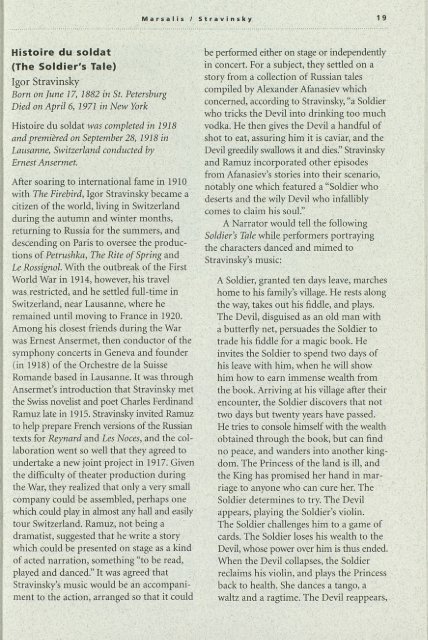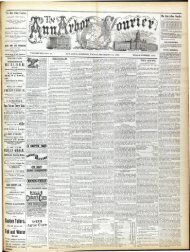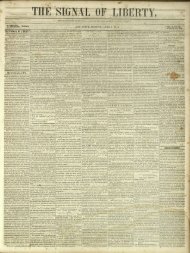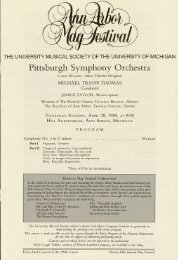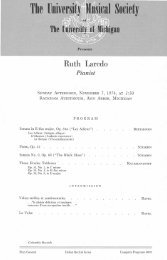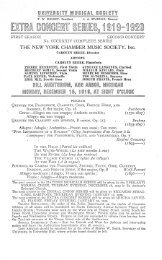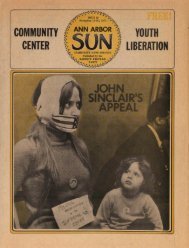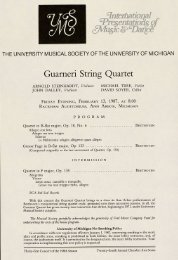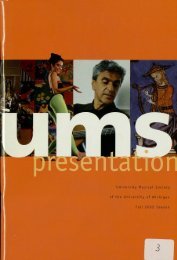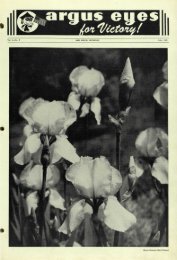Societyof the University of Michigan - Ann Arbor District Library
Societyof the University of Michigan - Ann Arbor District Library
Societyof the University of Michigan - Ann Arbor District Library
You also want an ePaper? Increase the reach of your titles
YUMPU automatically turns print PDFs into web optimized ePapers that Google loves.
Histoire du soldat<br />
(The Soldier's Tale)<br />
Igor Stravinsky<br />
Born on June 17, 1882 in St. Petersburg<br />
Died on April 6, 1971 in New York<br />
Histoire du soldat was completed in 1918<br />
andpremiered on September 28, 1918 in<br />
Lausanne, Switzerland conducted by<br />
Ernest Ansermet.<br />
After soaring to international fame in 1910<br />
with The Firebird, Igor Stravinsky became a<br />
citizen <strong>of</strong> <strong>the</strong> world, living in Switzerland<br />
during <strong>the</strong> autumn and winter months,<br />
returning to Russia for <strong>the</strong> summers, and<br />
descending on Paris to oversee <strong>the</strong> produc<br />
tions <strong>of</strong> Petrushka, The Rite <strong>of</strong> Spring and<br />
Le Rossignol. With <strong>the</strong> outbreak <strong>of</strong> <strong>the</strong> First<br />
World War in 1914, however, his travel<br />
was restricted, and he settled full-time in<br />
Switzerland, near Lausanne, where he<br />
remained until moving to France in 1920.<br />
Among his closest friends during <strong>the</strong> War<br />
was Ernest Ansermet, <strong>the</strong>n conductor <strong>of</strong> <strong>the</strong><br />
symphony concerts in Geneva and founder<br />
(in 1918) <strong>of</strong> <strong>the</strong> Orchestre de la Suisse<br />
Romande based in Lausanne. It was through<br />
Ansermet's introduction that Stravinsky met<br />
<strong>the</strong> Swiss novelist and poet Charles Ferdinand<br />
Ramuz late in 1915. Stravinsky invited Ramuz<br />
to help prepare French versions <strong>of</strong> <strong>the</strong> Russian<br />
texts for Reynard and Les Noces, and <strong>the</strong> col<br />
laboration went so well that <strong>the</strong>y agreed to<br />
undertake a new joint project in 1917. Given<br />
<strong>the</strong> difficulty <strong>of</strong> <strong>the</strong>ater production during<br />
<strong>the</strong> War, <strong>the</strong>y realized that only a very small<br />
company could be assembled, perhaps one<br />
which could play in almost any hall and easily<br />
tour Switzerland. Ramuz, not being a<br />
dramatist, suggested that he write a story<br />
which could be presented on stage as a kind<br />
<strong>of</strong> acted narration, something "to be read,<br />
played and danced." It was agreed that<br />
Stravinsky's music would be an accompani<br />
ment to <strong>the</strong> action, arranged so that it could<br />
Marsalis / Stravinsky 19<br />
be performed ei<strong>the</strong>r on stage or independently<br />
in concert. For a subject, <strong>the</strong>y settled on a<br />
story from a collection <strong>of</strong> Russian tales<br />
compiled by Alexander Afanasiev which<br />
concerned, according to Stravinsky, "a Soldier<br />
who tricks <strong>the</strong> Devil into drinking too much<br />
vodka. He <strong>the</strong>n gives <strong>the</strong> Devil a handful <strong>of</strong><br />
shot to eat, assuring him it is caviar, and <strong>the</strong><br />
Devil greedily swallows it and dies." Stravinsky<br />
and Ramuz incorporated o<strong>the</strong>r episodes<br />
from Afanasiev's stories into <strong>the</strong>ir scenario,<br />
notably one which featured a "Soldier who<br />
deserts and <strong>the</strong> wily Devil who infallibly<br />
comes to claim his soul."<br />
A Narrator would tell <strong>the</strong> following<br />
Soldier's Tale while performers portraying<br />
<strong>the</strong> characters danced and mimed to<br />
Stravinsky's music:<br />
A Soldier, granted ten days leave, marches<br />
home to his family's village. He rests along<br />
<strong>the</strong> way, takes out his fiddle, and plays.<br />
The Devil, disguised as an old man with<br />
a butterfly net, persuades <strong>the</strong> Soldier to<br />
trade his fiddle for a magic book. He<br />
invites <strong>the</strong> Soldier to spend two days <strong>of</strong><br />
his leave with him, when he will show<br />
him how to earn immense wealth from<br />
<strong>the</strong> book. Arriving at his village after <strong>the</strong>ir<br />
encounter, <strong>the</strong> Soldier discovers that not<br />
two days but twenty years have passed.<br />
He tries to console himself with <strong>the</strong> wealth<br />
obtained through <strong>the</strong> book, but can find<br />
no peace, and wanders into ano<strong>the</strong>r king<br />
dom. The Princess <strong>of</strong> <strong>the</strong> land is ill, and<br />
<strong>the</strong> King has promised her hand in mar<br />
riage to anyone who can cure her. The<br />
Soldier determines to try. The Devil<br />
appears, playing <strong>the</strong> Soldier's violin.<br />
The Soldier challenges him to a game <strong>of</strong><br />
cards. The Soldier loses his wealth to <strong>the</strong><br />
Devil, whose power over him is thus ended.<br />
When <strong>the</strong> Devil collapses, <strong>the</strong> Soldier<br />
reclaims his violin, and plays <strong>the</strong> Princess<br />
back to health. She dances a tango, a<br />
waltz and a ragtime. The Devil reappears,


